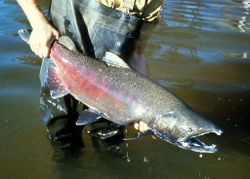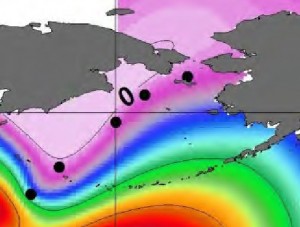South Yuba River Citizens League (SYRCL), Mar 16, 2017 (emphasis added): The low salmon run size for the Yuba River appears to be part of another regional salmon collapse. The California Department of Fish and Wildlife point to preliminary data from the Sacramento River that indicates salmon runs have also dropped to record low levels. According to Dan Bacher’s reporting, last year’s salmon run on the Klamath River was a 38-year low… Gary Reedy, SYRCL’s consulting salmon expert reports that “A new crash for the Central Valley Chinook salmon is not unexpected.”…
The Oregonian, Mar 15, 2017: Worst Klamath chinook run on record forecast — The worst run forecast on record for the Klamath River’s chinook salmon could close all salmon fishing along most of the Oregon Coast this summer…
Mendocino Beacon, Mar 16, 2017: Returns of spawning Klamath River fall Chinook are projected to be the lowest on record in 2017… “The salmon runs this year will present a challenge for ocean fishermen and managers throughout the West Coast,” said Executive Director Chuck Tracy… “the low forecast for Klamath River fall Chinook is unprecedented”… “This year will be an exceptionally difficult year for ocean salmon fisheries, especially in Oregon and California”… said Council Chair Herb Pollard.
Chinook Salmon
‘Troubling News’: Only 1% of sockeye salmon coming into US waters from Pacific — Lowest rate ever recorded, yet record high numbers were expected – Chinook salmon numbers ‘very low’, concern about pink salmon next year
The Olympian (Washington), Aug 24, 2014:
- ‘Warm blob’ keeps possible record sockeye run away from U.S. waters
- A development that has left local fishermen scratching their heads
- Data from the Pacific Salmon Commission [shows] about 99 percent of the sockeye salmon has gone through the Johnstone Strait around the northern part of Vancouver Island
- About 50 percent of the run [typically goes through] U.S. waters
- Nearly 2.9 million sockeye salmon have been caught in Canadian waters, while the U.S. fishermen had caught around 98,000
- This year’s diversion rate is unusual…, it would be the highest diversion rate on record, with data dating back to 1953… That would be troubling news
- Fishermen Pete Granger: “It could be one of the worst seasons we’ve had in a long time”
Unprecedented Decline In Alaska King Salmon
See also:
– Mystery Illness Killing Bald Eagles In Western U.S. – Wings Paralyzed, Full Blown Seizures
– Newspaper: Unprecedented declines in Alaska king salmon… related to impact from Fukushima? No comment, says NOAA biologist — Record low numbers seen in major fishery on Canada’s west coast, “alarming decrease” (ENENews, Dec 29, 2013):
Juneau Empire, Dec. 29, 2013: […] the king [chinook] salmon — has fallen from its throne. […] Alaska has seen unprecedented declines in recent years […] scientists like Joe Orsi and Jim Murphy, both fisheries research biologists with the National Oceanic and Atmospheric Administration, are digging deeper into […] the cause of the startling downward trend. […] When asked about the potential impact Fukushima may be having on king salmon stocks in the Gulf of Alaska and elsewhere in the state, Orsi would not comment. “I’ve been told to refer you to the (Environmental Protection Agency),” he said, “Because I’m not an expert on the topic.” Calls and emails to the EPA were not returned in time and digging on the federal agency’s site revealed no current information on radiation from the Fukushima disaster. The last posted monitoring results occurred in June of 2011.
Bellingham Herald, Dec. 5, 2013: “[…] we see from test fisheries that the Chinook numbers returning to the Fraser River system were at a record low,” explained Ken Balcomb, executive director and principal investigator for The Center for Research and a science advisor to the whale watch association. […] [An] alarming decrease of an important identified food resource […]
Islander Sound, Dec. 25, 2013: [A] dismal return of Chinook salmon to the Fraser River.
THE LAND GRABBERS STRIKE AGAIN (Veterans Today)
– THE LAND GRABBERS STRIKE AGAIN (Veterans Today, Nov 19, 2012):
“I don’t travel. If I did, I probably wouldn’t visit Israel. I remember how it was in 1948 when Israel was being established and all my Jewish friends were ecstatic. I was not. I said: What are we doing? We are establishing ourselves in a ghetto, in a small corner of a vast Muslim sea. The Muslims will never forget nor forgive. And Israel, as long as it exists, will be embattled. I was laughed at, but I was right. I can’t help but feel that the Jews didn’t really have the right to appropriate a territory only because 2000 years ago, people they consider their ancestors, were living there. History moves on and you can’t really turn it back.” — Jewish writer Isaac Asimov
Hizballah is the only Arab millitia which defeated the Jewish Army in the summer of 2006.
Commercial salmon fishing banned off western US
Seattle – US regulators on Thursday ordered a ban on all commercial salmon fishing off California, Oregon and Washington in an emergency effort to help the decimated salmon population to recover. Under the terms of the ban only limited recreational salmon fishing will be allowed on holiday weekends off the Oregon coast.

According to official figures the salmon stock is at a historic low point as fewer and fewer fall chinook, or king salmon, have been returning to the Sacramento and Klamath rivers, over the last three years. The dismally low numbers have not been seen since 1954 and 1964, state officials say.
Fishermen and scientists blame three main factors for the shortfall. Mismanagement of the rivers, whose waters are often dammed and diverted to irrigate fields; overfishing, and the absence of up normal ocean upwelling – which usually stirs up tons of the ocean’s offshore nutrients which are the essential food needed by young salmon to survive.
Fri, 11 Apr 2008 04:18:01 GMT
Source: earthtimes.org
Chinook Salmon Vanish Without a Trace
SACRAMENTO – Where did they go?
The Chinook salmon that swim upstream to spawn in the fall, the most robust run in the Sacramento River, have disappeared. The almost complete collapse of the richest and most dependable source of Chinook salmon south of Alaska left gloomy fisheries experts struggling for reliable explanations – and coming up dry.
Whatever the cause, there was widespread agreement among those attending a five-day meeting of the Pacific Fisheries Management Council here last week that the regional $150 million fishery, which usually opens for the four-month season on May 1, is almost certain to remain closed this year from northern Oregon to the Mexican border. A final decision on salmon fishing in the area is expected next month.
As a result, Chinook, or king salmon, the most prized species of Pacific wild salmon, will be hard to come by until the Alaskan season opens in July. Even then, wild Chinook are likely to be very expensive in markets and restaurants nationwide.


